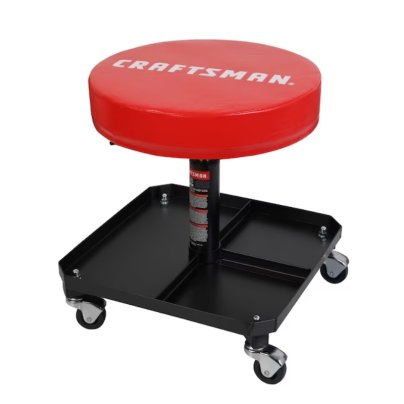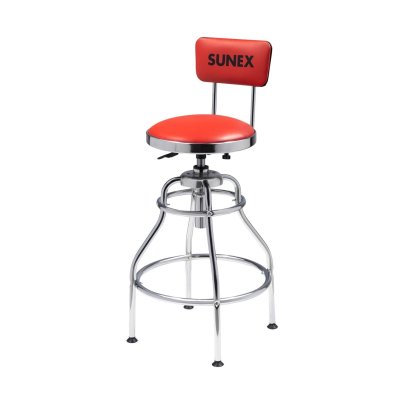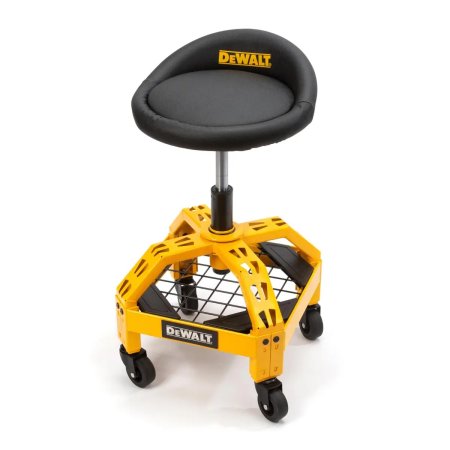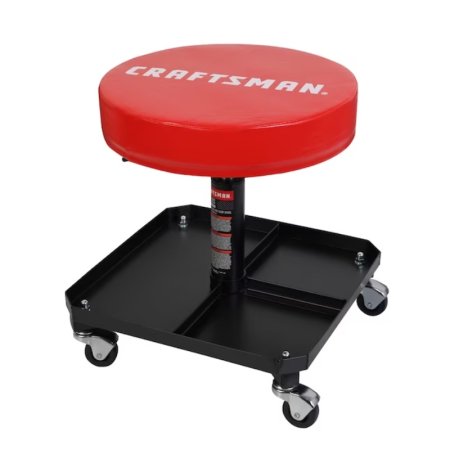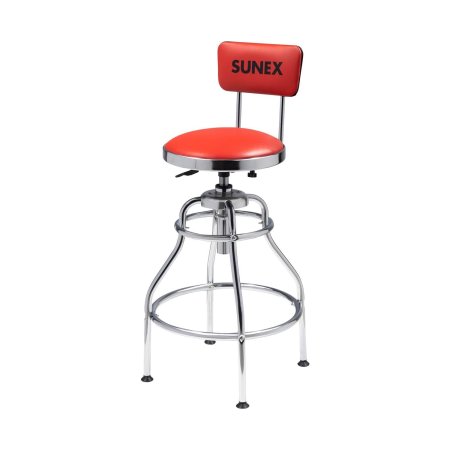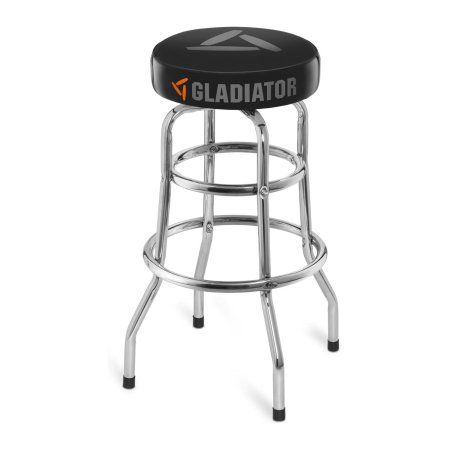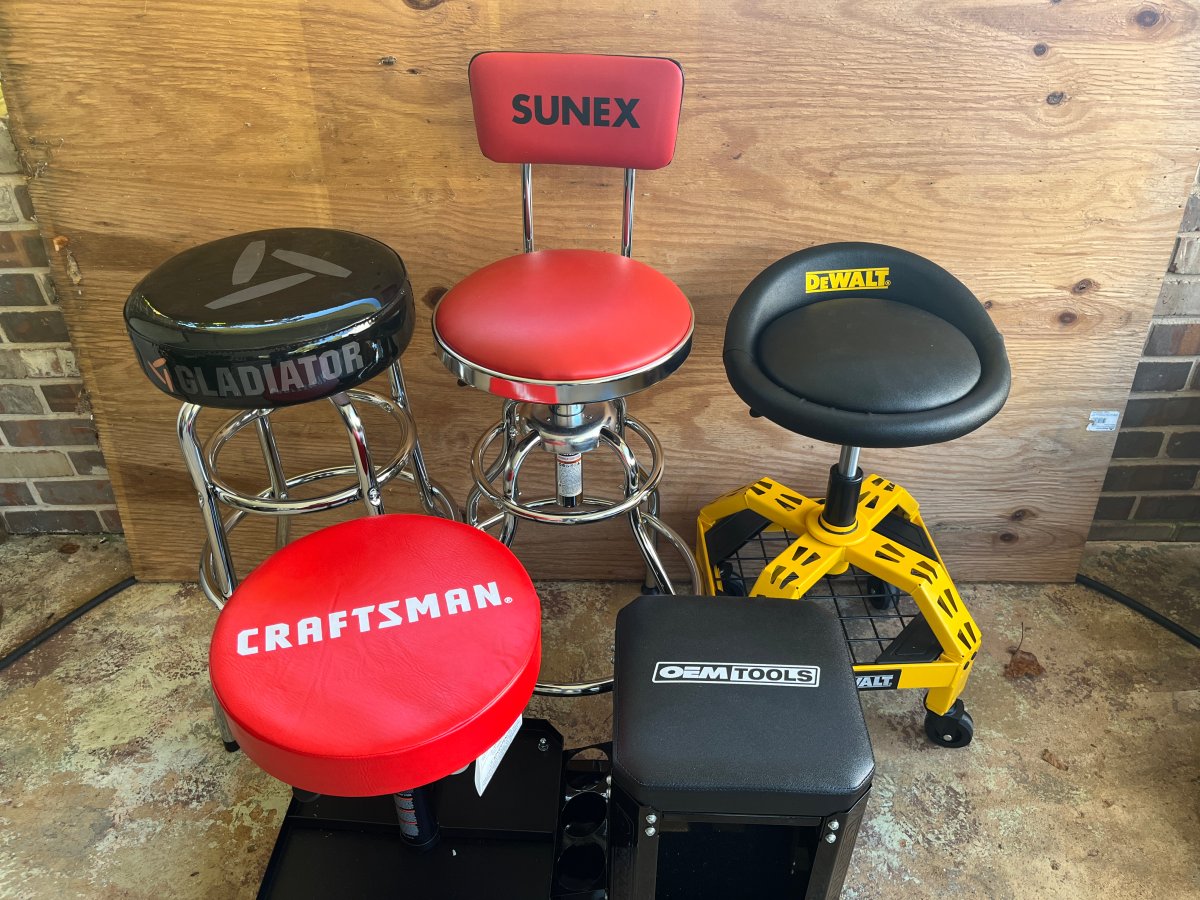
We may earn revenue from the products available on this page and participate in affiliate programs. Learn More ›
A good shop stool can help minimize fatigue and frustration. Along with a sturdy workbench, proper lighting, and accessible storage for tools, proper task seating improves comfort, efficiency, and safety. To find the best seat for your space, you’ll need to consider the projects, space, budget, and specific features you require. We recently spent 30 hours testing five popular shop stools while working at countertops, tabletops, and lower heights in our own garage and workshop.
The DeWalt Adjustable shop stool was our favorite because of its versatility. It comes with both casters and stationary feet, and it adjusts to accommodate both tabletop and countertop work. You may prefer one of the other models we tested if you prioritize a dedicated working height, a more comfortable seat, or better-organized onboard storage. In this review, we’ll detail our observations from testing each stool, and then share our shopping considerations to help you choose the best shop stool for your workspace.
- BEST OVERALL: DeWalt Adjustable Shop Stool With Casters
↓ Jump to Review - BEST BANG FOR THE BUCK: Craftsman Work Seat
↓ Jump to Review - BEST WITH BACKREST: Sunex Tools 8516 Hydraulic Shop Stool
↓ Jump to Review - BEST COUNTER-HEIGHT: Gladiator Garage Stool
↓ Jump to Review - BEST MECHANIC’S SEAT: OEMTools Black Rolling Workshop Creeper Seat
↓ Jump to Review
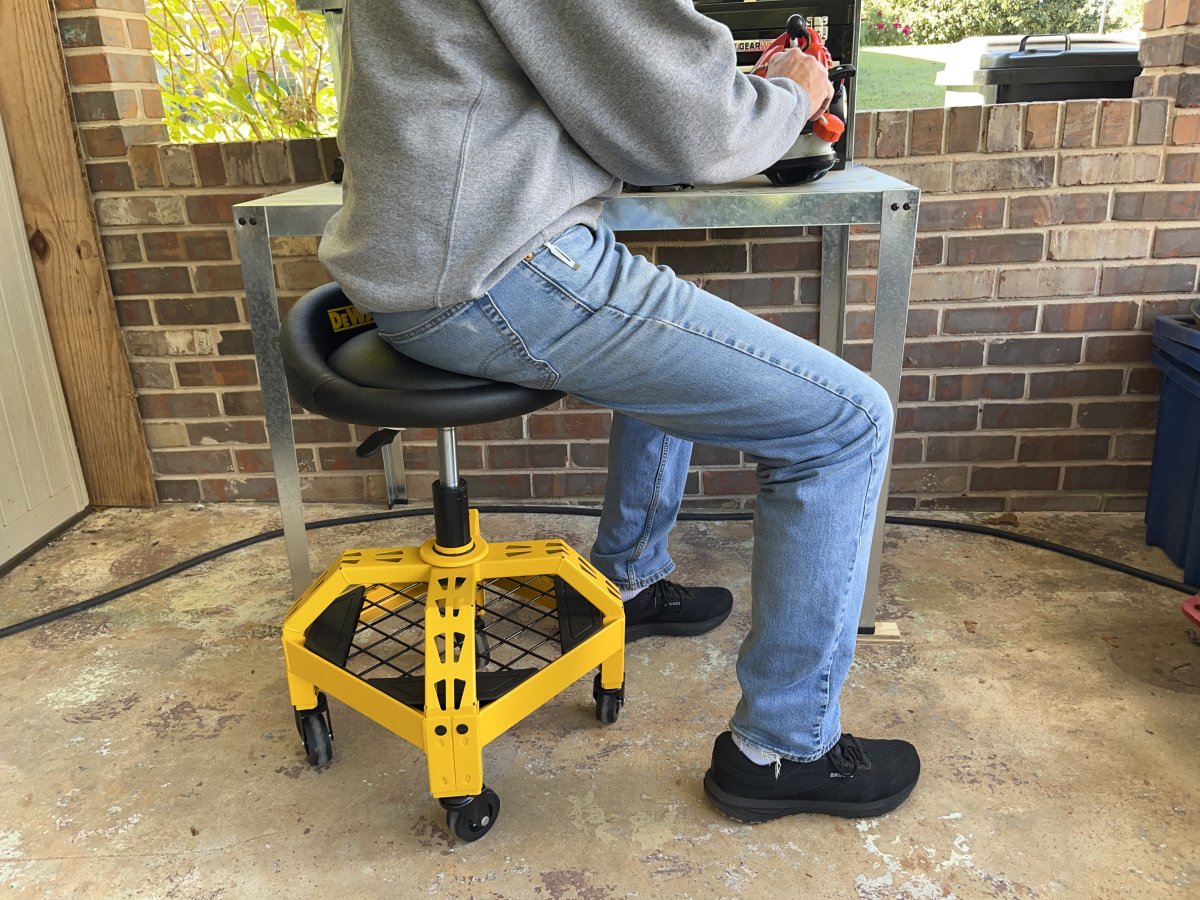
| Testing Stats | |
|---|---|
| Products tested | 5 |
| Time spent testing | 30 hours |
| Tests performed | 4 |
| Price range | $50 to $100 |
Our Top Picks
We tested these shop stools with comfort, quality, and value in mind. Read on for our hands-on analysis, including all of the details you will need to choose the best one for your workspace.
Best Overall
DeWalt Adjustable Shop Stool With Casters
Product Specs
- Height: Adjustable 22.5 inches to 26.75 inches
- Weight capacity: 300 pounds
- Wheels: 4 swivel casters
- Backrest: No
Our Ratings: Assembly 5/5; Durability 5/5; Comfort 4/5; Value 4.3/5
What We Like
- Powder-coated steel frame
- Adjustable-height swivel seat
- Almost no assembly required
- Kit includes casters and stationary feet
What We Don’t Like
- Seat is smallish
- Seat padding is domed and not very soft
We named the DeWalt Adjustable Shop Stool best overall because it’s incredibly strong and versatile. This rolling garage stool is built on a powder-coated steel frame that supports up to 300 pounds, and includes a heavy gauge wire shelf for under-seat storage. The kit comes with both casters and stationary feet to choose from, or you can swap them out as needed for the task at hand. The swivel seat adjusts from 22.5 inches to 26.75 inches high to accommodate either tabletop or counter-height work projects.
The DeWalt shop stool arrived almost completely assembled, so we added the casters and got right to work. The heavy-duty stool structure was super strong, so we didn’t have to worry about banging it around in the shop. The large casters rolled easily on our less-than-perfect concrete floor, which made for a smooth ride to the tool chest. A low center of gravity made the stool all but impossible to knock over. The highest and lowest seat positions felt comfortable for working at counter and table heights, but it wasn’t great for tall freestanding shop tools or chores that happen closer to the floor, such as changing lawnmower oil. The extra firm seat became less comfortable after a couple of hours of sitting.
What our tester says: “I really liked the heavy build and larger casters on this stool. It was super stable for seated work. If I needed to push it out of the way, it rolled smoothly across the floor.”—Mark Wolfe, Product Reviews tester and writer
Get the DeWalt shop stool at The Home Depot, Tractor Supply Co., or Blain’s Farm & Fleet.
Best Bang For The Buck
Craftsman Work Seat
Product Specs
- Height: Adjustable 17 inches to 22 inches
- Weight capacity: 300 pounds
- Wheels: 4 swivel casters
- Backrest: No
Our Ratings: Assembly 4/5; Durability 4/5; Comfort 5/5; Value 4.7/5
What We Like
- Excellent value for the quality
- Wide and comfortable
- Under-seat storage tray with 3 compartments
- Adjustable seat height
What We Don’t Like
- Lightweight build makes it feel less durable
There is no need to spend pro-level prices for a DIYer-friendly rolling stool for garage projects. The Craftsman Work Seat offers an excellent value for budget-minded buyers. The stool features a lightweight steel frame that rides on 4 casters and supports up to 300 pounds. A divided under-seat storage tray with 3 compartments offers a place to keep parts and tools organized as you work. It also comes with a cushy swivel seat that adjusts from 17 inches to 22 inches high, which is ideal for tabletop or lower freestanding projects.
We assembled the Craftsman shop stool in about 10 minutes. From a purely functional standpoint, we really liked the solid-bottom parts tray and single-post seat attachment. It was nice to have easy access to anything we put down there instead of having to reach around the framework to pull the part or tool we needed. After 6 hours of constant use, the soft, wide seat felt much more comfortable than most of the other stools we tested. The overall lightweight build of the stool gave us the impression that this stool might not be as durable as some of the others, but we’re willing to risk it for a much lower price.
Get the Craftsman shop stool at Lowe’s.
Best With Backrest
Sunex Tools 8516 Hydraulic Shop Stool
Product Specs
- Height: Adjustable 29 inches to 34 inches
- Weight capacity: 250 pounds
- Wheels: No
- Backrest: Yes
Our Ratings: Assembly 4/5; Durability 5/5; Comfort 5/5; Value 4.3/5
What We Like
- Comfortable swivel seat
- Adjustable backrest, 1.5 to 12 inches
- Adjustable seat height
- Sturdy steel frame
What We Don’t Like
- Lower weight rating than other stools we tested
When you’re sitting at a workstation all day, it’s nice to have a backrest for extra support when you’re taking a quick break. The Sunex Tools shop stool is just the right size for counter height projects or working with taller freestanding power tools. It features a sturdy chrome steel frame with stationary feet that supports up to 250 pounds. It comes equipped with a swivel seat that adjusts from 29 to 34 inches, and an in-out adjustable backrest to fit users of different sizes.
It took us about 20 minutes to assemble the Sunex Tools shop stool. Interestingly the dual-ring steel frame was nearly identical to another model we tested that came with a 300-pound weight limit, with the difference being this seat’s adjustable seat and backrest. With the seat in its highest position, it was a little wobbly, but when it was all the way down, it felt completely stable.
The padding on this tall shop stool was fairly thin, so we found ourselves taking more breaks halfway through the day. But the overall design felt extremely sturdy and fairly comfortable. The rubber feet provided excellent grip for a sturdy workstation. Outside of the workshop, the Sunex Tools shop stool would make an excellent barstool.
Get the Sunex Tools shop stool at Amazon, JB Tools, or Summit Racing.
Best Counter-Height
Gladiator Garage Stool
Product Specs
- Height: 30 inches
- Weight capacity: 300 pounds
- Wheels: No
- Backrest: No
Our Ratings: Assembly 4/5; Durability 5/5; Comfort 4/5; Value 4.3/5
What We Like
- Deep padded swivel seat
- Heavy-duty double-leg ring construction
- Rubber foot caps provide a stable working base
What We Don’t Like
- Not available with a backrest
A seat that adjusts up and down is only necessary for working at different heights. If you need a seat for a workstation that will not change, a fixed-height shop stool may be best. The Gladiator Garage Stool is 30 inches high with a deeply padded swivel seat and rubber feet for stability. The dual-ring steel frame supports up to 300 pounds. This is an ideal choice for either freestanding shop machinery or counter/bar height work surfaces.
We assembled the Gladiator shop stool in about 15 minutes, and once we tightened the screws, it felt super strong. We especially liked the extra thick seat padding, which was a standout feature among the test group. Unlike most of the others that seemed a bit too firm after a few hours, this one felt great throughout the 6-hour test. But we still needed to move around periodically because the vinyl seat cover prevents air circulation, and there’s no backrest.
The most compelling reason to buy this stool is its sturdy working base. We used this padded shop stool while sharpening chainsaw blades and operating the drill press because it sat at the perfect height, accommodated a full range of motion, and resisted slipping on the shop floor as we applied pressure on our workpieces.
Get the Gladiator shop stool at Amazon, Lowe’s, or JB Tools.
Best Mechanic's Seat
OEMTools Black Rolling Workshop Creeper Seat
Product Specs
- Height: 16.7 inches
- Weight capacity: 280 pounds
- Wheels: 4 swivel casters
- Backrest: No
Our Ratings: Assembly 4/5; Durability 5/5; Comfort 4/5; Value 4.7/5
What We Like
- Sturdy steel construction
- Several under-seat storage options
- Excellent workshop mobility
- Compact size, easy to stow when not in use
What We Don’t Like
- A little too low for some tasks
Easy mobility and plentiful storage highlight the OEMTools mechanic’s seat. This steel toolbox seat comes equipped with four swivel casters, weighs 19 pounds, and has a weight capacity of 280 pounds. The fixed-height seat sits just under 17 inches high. It allows the user to move freely around the shop with full access to select tools and parts.
This small rolling stool boasts numerous built-in storage features that can save trips back and forth to the mechanic’s toolbox. Two storage drawers are positioned just below the cushioned vinyl seat to conveniently hold sockets, wrenches, screwdrivers, and other common tools. A solid shelf at the base of the stool keeps parts and fasteners in easy reach. The stool also has three can holders for spray canisters that double as a place to safely stow a beverage while working.
We assembled the OEMTools shop stool in less than 20 minutes. It went together easily, and both the wheels and drawers moved smoothly. The stool felt very sturdy when we sat on it, but it was the only model we tested that was too low to work on a tabletop. It excels as a rolling toolbox, as we were able to load it with a few basic tools and a can of spray lubricant to do the preventative maintenance on our lawn equipment. The seat height was perfect for most of the work, and when we needed to get down on the floor to pull an oil plug or remove a lawn mower blade, it was nice to have the necessary tools close at hand.
What our tester says: “I liked that I could just load it with tools and parts and get to work. Whether I needed a seat or a rolling toolbox, it came in super handy.”—Mark Wolfe, Product Reviews tester and writer
Get the OEMTools shop stool at Amazon, Walmart, or Summit Racing.
Jump to Our Top Picks
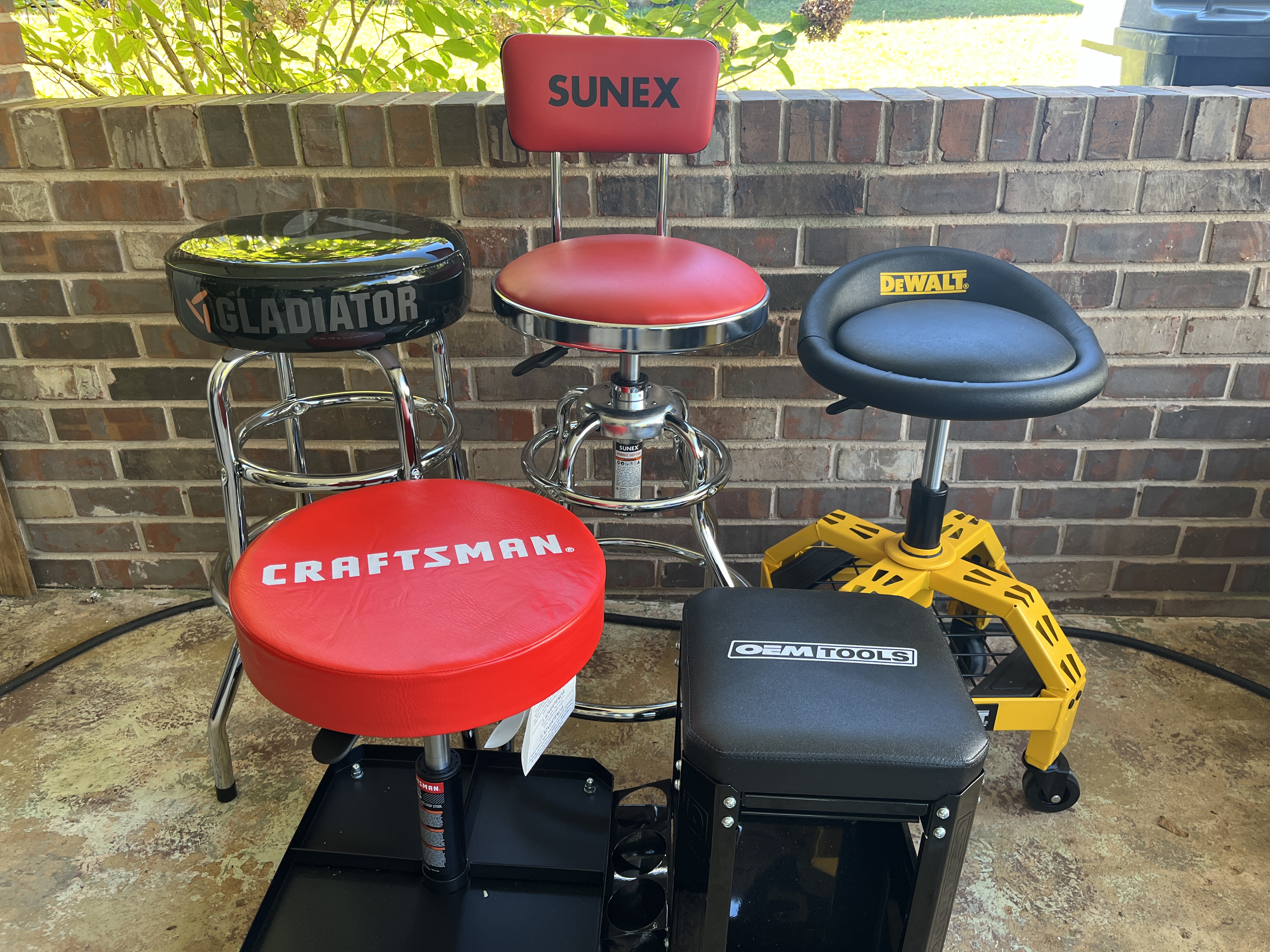
How We Tested the Best Shop Stools
After compiling a list of top-ranked shop stools according to customer ratings, we selected an assortment of models to highlight the variety of available types and sizes. We assembled each and spent three weeks using them in the most realistic ways possible. For wheeled models, we rolled between workstations and supply cabinets and evaluated them for a combination of smooth mobility and working stability. For stationary stools, we prioritized seat comfort and working stability. We tried out all of the available features, such as swivel seats, adjustable height, storage trays, etc. After using each stool for at least 6 hours, we scored them on a scale of 1 to 5 for assembly, durability, comfort, and value, nothing the pros and cons of each on our scoring rubric.
What to Consider When Choosing a Shop Stool
A well-outfitted workshop often leads to more work getting done—whether tinkering with engines or crafting cabinets. In shop stools, factor in the material, height range, weight capacity, and any features that could increase comfort, such as a backrest, footrest, or cushioning.
Material
From the base to the seat to any built-in storage compartments, materials matter if a shop stool is to stand up to rugged use. Ideally, the frame and base will be made of powder-coated steel or stainless steel—durable materials that resist impact, moisture, and corrosion. The seat may be made of nylon or plastic, with padding for extra comfort. Storage compartments are typically plastic, though some models have metal drawers.
Height
Shop stools range in height from 15 inches to 40 inches, but the right height depends on the particulars of each project. Shorter stools are geared toward working on vehicles as an alternative to kneeling while replacing old brake pads, for instance. Taller stools are usually intended for use at a workbench, providing comfort while concentrating on a detailed project.
Most shop stools have pneumatic adjustment systems to control the height. An easily accessible lever releases or pulls in compressed air. Some models, however, may have a physical height adjustment system to change manually with set screws.
Weight Capacity
The weight capacity of a standard stool may refer solely to the maximum weight of the user. Stools with built-in storage compartments will indicate the total weight that the stool can support—user and tools combined.
Comfort
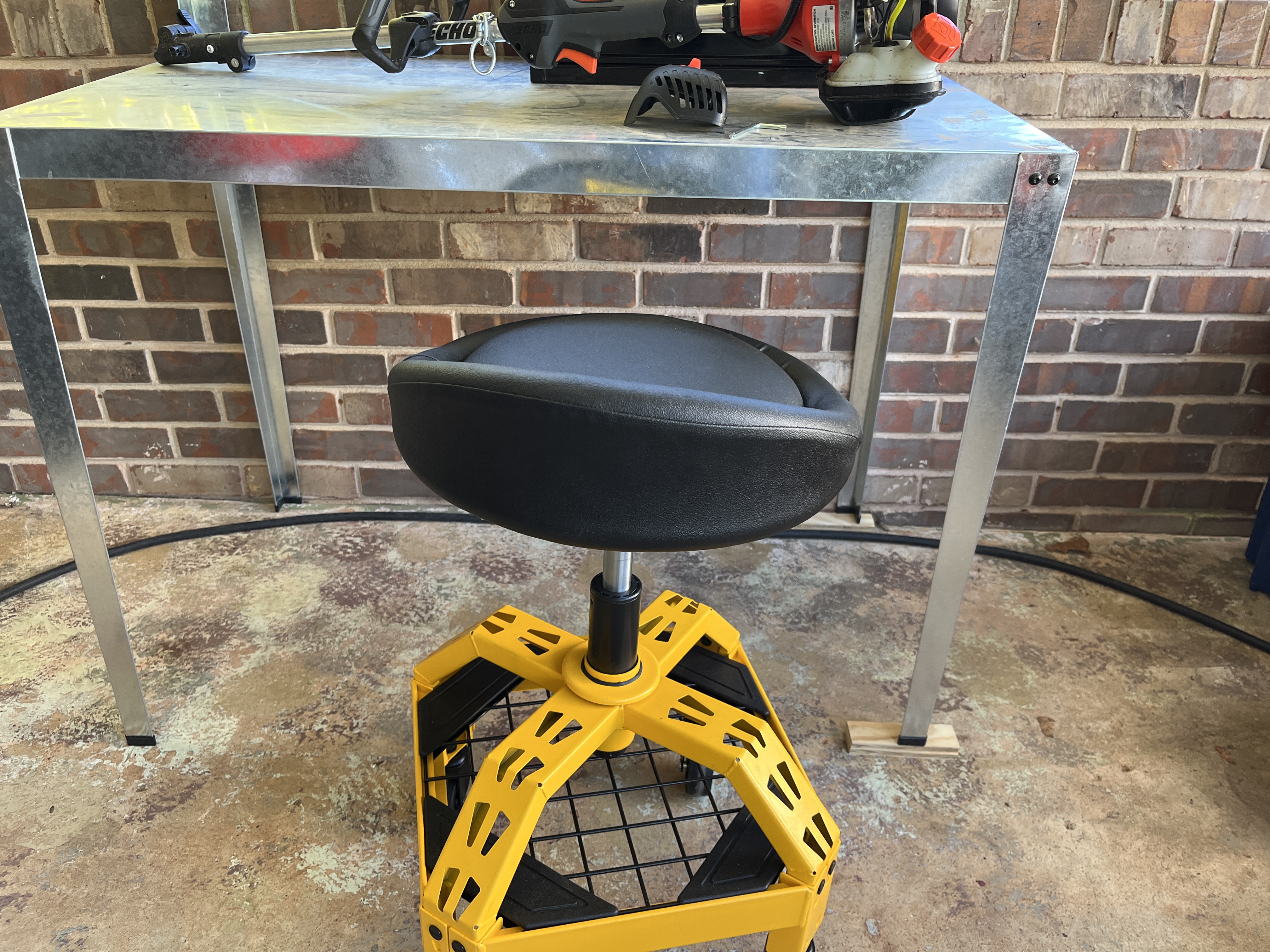
Without the ability to sit comfortably, the body shifts and moves constantly or else settles into a twisted or hunched position, both of which can lead to aching muscles. A cushioned seat on a shop stool helps support body weight without flexing or sagging, making it more pleasurable to focus on tasks. A built-in backrest helps the user take breaks, while a footrest allows repositioning of the feet.
Tool Tray
Some of the best shop stools are designed with convenient storage options, one of which is a tool tray. These come in a range of sizes with various compartments for tools and accessories, such as spray paint, oil, screwdrivers, wrenches, fasteners, and a hammer. Some models have pull-out drawers built into the side or the back of the stool for larger tools, like a compact circular saw or rotary tool. Other shop stools feature tool holsters to keep small power tools within easy reach.
Portability
For easy portability, a shop stool should weigh less than 20 pounds so it can be lifted without strain. In a heavier model, look for wheels to glide around the floor of the garage or workshop.
FAQs
Pneumatic height adjustment shop stools use pressurized air to lift and lower the seat. The more pressurized air in the pneumatic tube, the higher the seat sits. Lowering the stool pushes out air.
The ideal height of the shop stool depends on both the height of the user and the height of the workbench or project. A stool shouldn’t cause you to bend over the top of projects or stretch upward just to properly see your project. For the best results, consider a shop stool with an adjustable height setting.
Consider your shop setup to find a location where you can store the stool safely out of the way, but within easy reach. A few good places include a free corner of the workshop or garage, tucked under a raised workbench, or right next to the workbench.
For metal stools and vinyl seats, use a sponge or soft cloth and soapy water to clean your shop stool.
If you move around frequently, then a shop stool with wheels can improve your mobility. A stationary stool is the better option where stability is most important.
A well-built shop stool can last decades. Rolling shop stools may have a shorter working life because casters are more likely to wear out with frequent heavy use.
The seat height should be about 12 inches lower than the height of your work surface. If your work surfaces vary, then an adjustable-height stool might be the best choice.
Meet the Tester
Mark Wolfe is a writer and product tester who spent 20 years in the nursery and landscaping industry. For more than twenty years he mowed, edged, planted, pruned, cultivated, irrigated, and renovated beautiful landscapes. Now he tests and writes reviews about the latest outdoor power equipment, hand tools, lawn care products, and other outdoor living goods.
Additional research provided by Timothy Dale.

